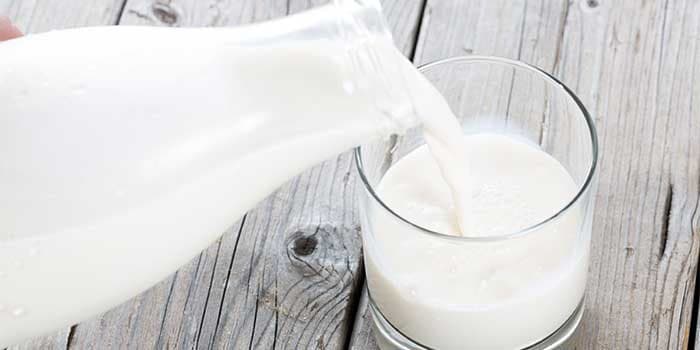Interested in trying our FREE 7-day healthy diet plan? Click here and choose between our meat eaters, vegetarian or vegan meal plans.
What is kefir?
Kefir is a cultured, fermented milk drink, originally from the mountainous region that divides Asia and Europe. It is similar to yogurt but thinner in consistency, making it more of a drink. Kefir has a tart, sour taste and a slight fizz, due to carbon dioxide – the end product of the fermentation process. The length of the fermentation time determines the flavour. Kefir is a good source of calcium and is rich in probiotic bacteria.
Discover our full range of health benefit guides. You can also learn how to make kefir at home or try it in our delicious kefir breakfast smoothie.
See our kefir recipe collection for more ideas.
Nutritional benefits
A serving (250ml) of whole milk kefir contains approximately:
- 145 kcal
- 8.3g protein
- 7.5g fat
- 11g carbs
- 333mg calcium
- 28mg magnesium
- 383mg potassium
- 0.7mcg B12
Milk is a good source of protein and calcium, and kefir is no different. However, it has the added benefits of probiotics. Probiotics are known as friendly bacteria that may ease IBS symptoms such as bloating and digestive distress in some people.
Enjoying kefir regularly has also been associated with benefits for blood pressure, cholesterol balance and blood sugar management. Plus, depending on the variety that you use, kefir grains may contain 30 or more strains of beneficial bacteria and yeasts. Some of the major strains include the lactobacillales – or lactic acid bacteria (LAB).
What are the 4 main health benefits of kefir?
1. Improves digestion
Some people find that kefir improves their digestion, potentially due to its probiotic content. Probiotics may help restore balance in the gut, thereby improving digestion.
The fermentation process also helps to break down the lactose in milk, so there is some evidence to suggest that kefir may be tolerated by those who suffer from lactose intolerance. However, you should speak to your GP if you think you may be lactose intolerant.
Those with a diagnosed condition such as inflammatory bowel disease (IBD) or irritable bowel syndrome (IBS) should consult with a GP or dietitian before introducing fermented foods because, in some cases, they can make symptoms worse.
2. May support weight loss
Obesity has been linked to an imbalance in gut bacteria. However, which strain of bacteria has an effect is less clear. Some evidence suggests that the lactobacillus species, or LAB group, like those found in kefir are associated with changes in weight, but more robust evidence is needed before recommendations can be made.
However, other evidence contradicts these findings, suggesting instead that probiotics do not decrease body weight or affect weight loss/BMI. Clearly this is an area for further research.
3. Promotes bone health
Traditional kefir made from cow’s milk is a good source of calcium and vitamin K, nutrients that are both important for bone health. As we get older, our bones become weaker, which can increase the risk of osteoporosis and fractures, especially in post-menopausal women. Kefir, along with other dairy products, is a useful source of dietary calcium.
4. Reduces inflammation
Inflammation is involved in a number of diseases such as IBD or rheumatoid arthritis. The anti-inflammatory and immunomodulatory effects of probiotics have been reported in some studies, although this is an emerging area of research. It does appear that the LAB bacteria are anti-inflammatory but whether that translates directly to kefir is still unknown.

Are there any side effects?
As the process used to make kefir can vary between brands, it is hard to monitor its potency, so some products may be richer sources of probiotic bacteria than others. For those who are not used to probiotics or fermented foods, it is sensible to start with a small amount and increase slowly. Some people report digestive symptoms such as bloating, constipation or diarrhoea when introducing fermented foods to the diet. Anyone with a compromised immune system or a histamine intolerance should speak to a health professional before introducing or increasing their fermented food intake.
What about water kefir?
Water kefir is made in a similar way to milk kefir. The kefir grains are placed in sugared water and the same fermentation process occurs (as in milk). The fermentation produces beneficial bacteria while reducing the sugar content of the drink. It’s important to note that the grains are different – water kefir is made with specific grains that rely on water, and will not work in the same way if put in milk or milk substitutes. Cane sugar or fruit juice can be used to sweeten the water. Water kefir is a great alternative source of probiotic bacteria for those who are following a dairy-free diet but does not contain the same protein and calcium content that’s provided by milk.
How is kefir made?
The method used to make kefir is one of the main differences between kefir and yogurt. Traditional milk kefir uses kefir grains and whole cow’s milk – although now you can find it made from goat’s milk, sheep’s milk and coconut milk as well as from rice and soy milk alternatives. Kefir grains are not actually grains at all – they are small gelatinous beads that look like grains and contain a variety of bacteria and yeasts. The grains are placed in a glass jar or bowl, soaked in milk, covered and left at room temperature for a minimum of 24 hours. This enables the bacteria and yeast to ferment the lactose (natural sugar in milk) into lactic acid, activating the bacteria to proliferate and grow.
After around 24 hours at room temperature, the grains are strained from the kefir and transferred to a fresh batch of milk and used again to enable them to keep reproducing – this cycle can be carried on indefinitely. The strained kefir is now ready to drink.
The grains will multiply as long as they are kept in fresh milk at the right temperature (ideally about 22-25C). When the product is put in the fridge, the cool temperature inhibits the fermentation process.
Is it safe to make kefir at home?
Absolutely! However, it is important to closely follow recipe instructions when fermenting at home as incorrect temperatures, fermentation times or unsterile equipment can cause the food to spoil, making it unsafe to eat.
If you’re curious to try it, check out our guide to making homemade kefir.
Liked this? Discover even more benefits guides…
Health benefits of lemon water
Health benefits of green tea
Health benefits of coconut milk
Health benefits of bananas
Health benefits of ginger
This page was updated on 5 August 2020 by Tracey Raye.
Jo Lewin is a registered nutritionist (RNutr) with the Association for Nutrition with a specialism in public health. Follow her on Twitter @nutri_jo.
All health content on bbcgoodfood.com is provided for general information only, and should not be treated as a substitute for the medical advice of your own doctor or any other healthcare professional. If you have any concerns about your general health, you should contact your local healthcare provider. See our website terms and conditions for more information.






